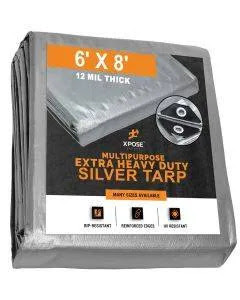Heavy Duty Industrial Tarps: Versatile Protection for Demanding Environments
In industrial settings where heavy equipment, machinery, and materials are exposed to harsh conditions, reliable protection is essential to prevent damage, corrosion, and deterioration. Heavy duty industrial tarps emerge as indispensable solutions for safeguarding assets, providing versatile protection against environmental elements, debris, and abrasion. These rugged and durable tarps are engineered to withstand the rigors of industrial environments, making them essential equipment for construction sites, manufacturing facilities, warehouses, and transportation operations. In this article, we explore the features, applications, and benefits of heavy duty industrial tarps.
Exceptional Durability and Strength:
Heavy duty industrial tarps are constructed from robust materials such as reinforced polyethylene, vinyl, or canvas, which are engineered to withstand heavy loads, abrasion, and extreme weather conditions. These tarps are designed to resist tears, punctures, and UV degradation, ensuring long-lasting protection for industrial assets. Additionally, reinforced hems, double-stitched seams, and rust-resistant grommets enhance the overall strength and durability of these tarps, making them capable of withstanding demanding environments.
Weather Resistance:
Industrial operations often take place in outdoor environments where equipment and materials are exposed to rain, snow, wind, and sun. Heavy duty industrial tarps provide reliable protection against the elements, shielding assets from moisture, UV radiation, and temperature fluctuations. Whether used as temporary covers for construction materials, equipment storage, or outdoor work areas, these tarps help prevent corrosion, rust, and degradation caused by prolonged exposure to harsh weather conditions.
Versatile Applications:
Heavy duty industrial tarps find a wide range of applications across various industries and sectors. They are commonly used to cover construction materials, machinery, and equipment on job sites, providing protection against dust, debris, and inclement weather. Additionally, these tarps are employed in manufacturing facilities to shield raw materials, finished products, and work-in-progress from contamination or damage. In transportation and logistics operations, heavy duty tarps are used to secure and protect cargo during transit, ensuring that goods arrive at their destination intact and undamaged.
Customization Options:
Heavy duty industrial tarps are available in a variety of sizes, shapes, and configurations to suit specific application requirements. Customization options may include reinforced corners, welded seams, D-rings, and grommets positioned at strategic intervals for secure anchoring and attachment. Additionally, industrial tarps can be tailored to accommodate specialized equipment or machinery, providing a precise fit and optimal coverage for maximum protection.
Abrasion and Tear Resistance:
In industrial environments where equipment and materials are subject to frequent movement and handling, resistance to abrasion and tears is essential to ensure the longevity and effectiveness of protective coverings. Heavy duty industrial tarps are engineered to withstand abrasion from rough surfaces and sharp edges, as well as resist tearing from heavy loads or impact. This durability ensures that the tarps remain intact and provide reliable protection under demanding conditions.
Easy Maintenance and Cleaning:
Despite their rugged construction, heavy duty industrial tarps are relatively easy to maintain and clean. Most tarps can be washed with soap and water using a soft brush or cloth to remove dirt, debris, and stains. Additionally, periodic inspection and maintenance help identify any signs of wear, damage, or degradation, allowing for timely repairs or replacements as needed. Proper care and maintenance ensure that industrial tarps remain in optimal condition and continue to provide effective protection for industrial assets.
Cost-Effective Protection:
While heavy duty industrial tarps may require an initial investment, their long-term benefits in terms of asset protection, durability, and versatility make them a cost-effective solution for industrial applications. By safeguarding equipment, materials, and infrastructure from damage, corrosion, and deterioration, these tarps help minimize maintenance and replacement costs, as well as prevent costly downtime and disruptions to operations. Additionally, the durability and longevity of industrial tarps ensure that they provide reliable protection for years to come, maximizing the return on investment for industrial users.

Comments
Post a Comment